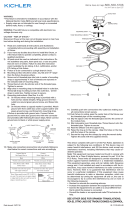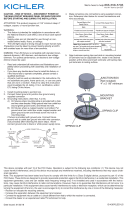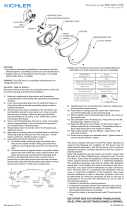Page is loading ...

WARNING:
• This fixture is intended for installation in accordance with the
National Electric Code (NEC) and all local code specifications.
• Supply wires are not intended for use through or concealed
behind walls, floors, or ceilings.
• The LED light output is strong enough to injure human eyes.
Precautions must be taken to prevent looking directly at LED’s
with unaided eyes for more than a few seconds.
DIMMING: This LED fixture is compatible with electronic low
voltage dimmers only.
1) Read and understand all instructions and illustrations completely
before proceeding with assembly and installation of fixture.
2) If you have any doubts about how to install this fixture, or if
the fixture fails to operate completely, please contact a
qualified electrician.
3) All parts must be used as indicated in the instructions. Do not
substitute any parts, leave parts out, or use any parts that are
worn or broken. Failure to obey this instruction could invalidate
the UL listing, C.S.A. certification, and/or ETL listing of this fixture.
4) Fixture is to be connected to a single branch circuit.
1) TURN OFF POWER.
IMPORTANT: Before you start, NEVER attempt any work
without shutting off the electricity until the work is done.
a) Go to the main fuse, or circuit breaker, box in your home.
Place the main power switch in the “OFF” position.
b) Unscrew the fuse(s), or switch “OFF” the circuit breaker
switch(s), that control the power to the fixture or room that
you are working on.
c) Place the wall switch in the “OFF” position. If the fixture to
be replaced has a switch or pull chain, place those in the
“OFF” position.
2) Grounding instructions: (See Illus. A or B).
A) On fixtures where mounting strap is provided with a hole
and two raise dimples. Wrap ground wire from outlet box
around green ground screw, and thread into hole.
B) On fixtures where a cupped washer is provided. Put ground
wire from outlet box under cupped washer and green
ground screw and thread screw into hole in mounting strap.
If fixture is provided with ground wire. Connect fixture ground
wire to outlet box ground wire with wire connector, (not provided)
after following the above steps. Never connect ground wire to
black or white power supply wires.
GREEN GROUND
SCREW
CUPPED
WASHER
A
B
OUTLET BOX
GROUND
FIXTURE
GROUND
DIMPLES
WIRE CONNECTOR
(NOT PROVIDED)
OUTLET BOX
GROUND
GREEN GROUND
SCREW
FIXTURE
GROUND
Connect Black or
Red Supply Wire to:
Connect
White Supply Wire to:
Black White
*Parallel cord (round & smooth) *Parallel cord (square & ridged)
Clear, Brown, Gold or Black
without tracer
Clear, Brown, Gold or Black
with tracer
Insulated wire (other than green)
with copper conductor
Insulated wire (other than green)
with silver conductor
*Note: When parallel wires (SPT I & SPT II)
are used. The neutral wire is square shaped
or ridged and the other wire will be round in
shape or smooth (see illus.)
Neutral Wire
Date Issued: 8/28/15 IS-43846LED-US
LENS COVER
PROTECCIÓN
DEL LENTE
FIXTURE
ARTEFACTO
We’re here to help 866-558-5706
Hrs: M-F 9am to 5pm EST
SCREW
TORNILLO
3) Make wire connections. Reference chart below for correct
connections and wire accordingly.
4) Mounting surface should be clean, dry, flat and 1/4” larger
than the fixture housing surface.
5) Twist lens cover counter-clockwise to remove from fixture.
6) Place fixture over outlet box, carefully passing fixture mounting
screws through clearance holes in canopy.
7) Any gaps in the mounting surface exceeding 3/16” should be
corrected as required.
8) Replace the lens cover back on the disk light by lining up tabs
on lens and turning to lock in place.
SEE OTHER SIDE FOR SPANISH TRANSLATIONS.
VEA EL OTRO LADO DE TRADUCCIONES AL ESPAÑOL.
This device complies with part 15 of the FCC Rules. Operation is subject to the following two conditions: (1) This device may not cause
harmful interference, and (2) this device must accept any interference received, including interference that may cause undesired operation.
Note: This equipment has been tested and found to comply with the limits for a Class B digital device, pursuant to part 15 of the FCC Rules.
These limits are designed to provide reasonable protection against harmful interference in a residential installation. This equipment gener-
ates, uses and can radiate radio frequency energy and, if not installed and used in accordance with the instructions, may cause harmful
interference to radio communications. However, there is no guarantee that interference will not occur in a particular installation. If this equip-
ment does cause harmful interference to radio or television reception, which can be determined by turning the equipment off and on, the
user is encouraged to try to correct the interference by one or more of the following measures:
• Reorient or relocate the receiving antenna.
• Increase the separation between the equipment and receiver.
• Connect the equipment into an outlet on a circuit different from that to which the receiver is connected.
• Consult the dealer or an experienced radio/TV technician for help.

AVERTISSEMENT:
• Ce luminaire doit être installé conformément aux codes
d’électricité nationaux (NEC) et satisfaire toutes les spécifications
des codes locaux.
• Les câbles d’alimentation ne doivent pas être utilisés à travers
ou derrière des parois, sols ou plafonds.
• L’intensité de la lumière des LED peut endommager les yeux.
Prendre toutes les précautions nécessaires pour ne pas regard
er directement dans les LED sans protection pendant plusieurs
secondes.
GRADATION: Ce luminaire LED est compatible avec les gradateurs
standard à incandescence, gradateurs LED, et gradateurs électro-
niques a basse tension. Pour une performance optimale, utiliser un
gradateur électronique à basse tension.
1) Lire et comprendre toutes les instructions et illustrations avant
de procéder au montage et à l’installation du luminaire.
2) En cas de doute sur l’installation de ce luminaire, ou si le
luminaire ne fonctionne pas correctement, prière de contacter
un électricien agréé.
3) Utiliser toutes les pièces selon les instructions. Ne pas
substituer de pièces, exclure certaines pièces du montage ou
se servir de pièces usées ou endommagées. Le non-respect
de ces instructions risque d’annuler l’homologation UL, le
certificat C.S.A. ainsi que l’homologation ETL de ce luminaire.
4) Le luminaire peut être connecté à un circuit dédié.
1) APAGUE LA ALIMENTACIÓN ELÉCTRICA.
IMPORTANTE: Antes de comenzar, NUNCA trate de trabajar
sin antes desconectar la corriente hasta que el trabajo se
termine.
a) Vaya a la caja principal de fusibles, o interruptor o caja de
circuitos de su casa. Coloque el interruptor de la corriente
principal en posición de apagado “OFF”.
b) Desatornille el (los) fusible (s), o coloque el interruptor o
interruptores del breaker en posición de apagado “OFF”,
que controla (n) la corriente hacia el artefacto o habitación
donde está trabajando.
c) Coloque el interruptor de pared en posición de apagado
“OFF”. Si el artefacto que se va a reemplazar tiene un
interruptor o cadena que se jala, colóquelos en la posición
de apagado “OFF”.
2) Instrucciones de puesta a tierra: (Vea la ilustración A o B)
A) En los artefactos donde se proporciona la abrazadera de
montaje con un agujero y dos depresiones elevadas.
Envuelva el alambre a tierra de la caja de salida alrededor
del tornillo a tierra verde y rosque el tornillo en el agujero.
B) En los artefactor donde se proporciona una arandela
cóncava. Ponga el alambre a tierra de la caja de salida
entre la arandela cóncava y el tornillo a tierra verde y
rosque el tornillo en el agujero, en la abrazadera de montaje.
Si se proporciona el artefacto con alambre a tierra, conecte el
alambre a tierra del artefacto al alambrea a tierra de la caja de
salida, con el conector de alambre (no proporcionado), después
de seguir los pasos de arriba. Nunca conecte el alambre a
tierra a los alambres blanco o negro de la alimentación eléctrica.
3) Hacer las conexiones de los alambres (conectores no incluidos.)
Ver el cuadro más abajo para las conexiones correctas y
alambrar de acuerdo a esto.
4) La superficie de montaje debe estar limpia, seca, plana y ser
1/4” más grande que la superficie de la cubierta del artefacto.
5) Gire la protección del lente en sentido contrario a las agujas
del reloj para removerlo del artefacto.
6) Coloque el artefacto sobre la caja de conexiones, pasando
cuidadosamente los tornillos de montaje a través de los
agujeros de paso en el escudete.
7) Cualquier espacio abierto en la superficie de montaje que
exceda 3/16” deberá ser corregido según sea requerido.
8) Vuelva a poner la protección del lente en el artefacto alinean
do las lengüetas en el lente y girando para asegurar en su lugar.
Date Issued: 8/28/15 IS-43846LED-US
We’re here to help 866-558-5706
Hrs: M-F 9am to 5pm EST
ARANDELA
CONCAVA
A
B
TIERRA DE LA
CAJA DE SALIDA
TORNILLO DE TIERRA,
VERDE
DEPRESIONES
TIERRA
ARTEFACTO
CONECTOR DE ALAMBRE
(NO SE PROVEE)
TIERRA DE LA
CAJA DE SALIDA
TORNILLO DE TIERRA,
VERDE
TIERRA
ARTEFACTO
Conectar el alambre de
suministro negro o rojo al
Conectar el alambre de
suministro blanco al
Negro Blanco
*Cordon paralelo (redondo y liso)
*Cordon paralelo (cuadrado y estriado)
Claro, marrón, amarillio o negro
sin hebra identificadora
Claro, marrón, amarillio o negro
con hebra identificadora
Alambre aislado (diferente del verde)
con conductor de cobre
Alambre aislado (diferente del
verde) con conductor de plata
*Nota: Cuando se utiliza alambre paralelo
(SPT I y SPT II). El alambre neutro es de forma
cuadrada o estriada y el otro alambre será de
forma redonda o lisa. (Vea la ilustracíón).
Hilo Neutral
SEE OTHER SIDE FOR ENGLISH TRANSLATIONS.
VEA EL OTRO LADO DE TRADUCCIONES AL INGLÉS.
Este artefacto cumple con la parte 15 de las Normas de la FCC. El funcionamiento está sujeto a las siguientes dos condiciones: (1) Este
artefacto no puede causar interferencia perjudicial, y (2) este artefacto debe aceptar cualquier interferencia recibida, inclusive interferencia
que puede causar una operación no deseada.
Nota: Este equipo ha sido probado y se comprobó que cumple con los límites para un artefacto digital Clase B, de conformidad con la parte
15 de las Normas de la FCC. Estos límites están diseñados para proporcionar una protección razonable contra interferencia perjudicial en
una instalación residencial. Este equipo genera, usa y puede radiar energía de radio frecuencia y, si no se instala y usa de acuerdo con las
instrucciones, puede causar interferencia perjudicial las comunicaciones de radio. Sin embargo, no hay garantía que la interferencia no
ocurrirá en una instalación en particular. Si este equipo sí causa interferencia perjudicial a la recepción de radio o televisión, que puede ser
determinado enciendo y apagando el equipo, se alienta al usuario a que trata de corregir la interferencia con una o más de las siguientes
medidas:
• Reoriente o cambie de lugar la antena de recepción.
• Aumente la separación entre el equipo y el receptor.
• Conecte el equipo en un receptáculo en un circuito diferente de donde está conectado el receptor.
• Consulte al distribuidor o a un técnico de radio/TV experimentado para ayuda.
LENS COVER
PROTECCIÓN
DEL LENTE
FIXTURE
ARTEFACTO
SCREW
TORNILLO
/








